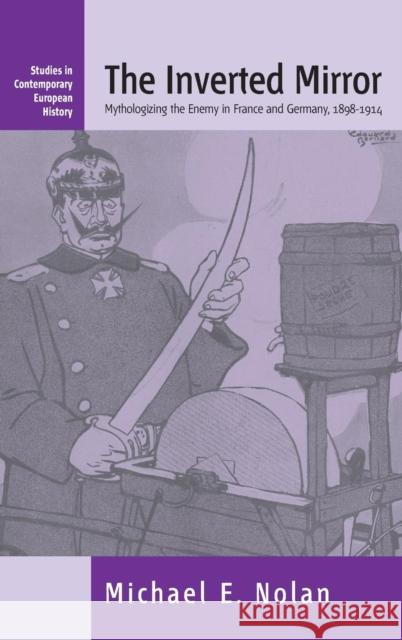The Inverted Mirror: Mythologizing the Enemy in France and Germany 1898-1914 » książka
The Inverted Mirror: Mythologizing the Enemy in France and Germany 1898-1914
ISBN-13: 9781571816696 / Angielski / Twarda / 2004 / 154 str.
.".".a balanced and perceptive analysis...a superb monograph."" - The Historian .".".an interesting political application of the psychological tendency to overlook our own weaknesses even as we attribute them to someone else...This work has obvious value as an introductory text for student historians of France and Germany; its study of cultural identities and national myths also makes it pertinent to young scholars interested in the workings of international affairs. Instructors of modern European history courses, or French or German civilization courses will find this volume to be valuable background reading."" - French Review ""Michael Nolan's broad and deep learning, sharp thinking, and elegant style combine to make fresh and exciting reading out of what might have been thought to be a familiar tale of bygone mutual hostility between two peoples and cultures. He bears his erudition lightly, yet it blows through every portion of this fine work."" - Rudolph Binion, Brandeis University ""This study shines by its elegance, erudition, and thoughtfulness ... It is a joy to read."" - Paul Jankowski, Brandeis University ""The comprehensive study...is convincing not least because of its substantial sources."" - Historische Zeitschrift It is hard to imagine nowadays that, for many years, France and Germany considered each other as ""arch enemies."" And yet, for well over a century, these two countries waged verbal and ultimately violent wars against each other. This study explores a particularly virulent phase during which each of these two nations projected certain assumptions about national character onto the other - distorted images, motivated by antipathy, fear, and envy, which contributed to the growing hostility between the two countries in the years before the First World War. Most remarkably, as the author discovered, the qualities each country ascribed to its chief adversary appeared to be exaggerated or negative versions of precisely those qualities that it perceived to be lacking or inadequate in itself. Moreover, banishing undesirable traits and projecting them onto another people was also an essential step in the consolidation of national identity. As such, it established a pattern that has become all too familiar to students of nationalism and xenophobia in recent decades. This study shows that antagonism between states is not a fact of nature but socially constructed. Michael Nolan received his Masters degree from the University of Massachusetts at Amherst and his doctorate from Brandeis University. He currently teaches at Western Connecticut State University in Danbury.
""...a balanced and perceptive analysis...a superb monograph."" · The Historian""...an interesting political application of the psychological tendency to overlook our own weaknesses even as we attribute them to someone else...This work has obvious value as an introductory text for student historians of France and Germany; its study of cultural identities and national myths also makes it pertinent to young scholars interested in the workings of international affairs. Instructors of modern European history courses, or French or German civilization courses will find this volume to be valuable background reading."" · French Review""Michael Nolans broad and deep learning, sharp thinking, and elegant style combine to make fresh and exciting reading out of what might have been thought to be a familiar tale of bygone mutual hostility between two peoples and cultures. He bears his erudition lightly, yet it blows through every portion of this fine work."" · Rudolph Binion, Brandeis University""This study shines by its elegance, erudition, and thoughtfulness ... It is a joy to read."" · Paul Jankowski, Brandeis University""The comprehensive study...is convincing not least because of its substantial sources."" · Historische ZeitschriftIt is hard to imagine nowadays that, for many years, France and Germany considered each other as ""arch enemies."" And yet, for well over a century, these two countries waged verbal and ultimately violent wars against each other. This study explores a particularly virulent phase during which each of these two nations projected certain assumptions about national character onto the other - distorted images, motivated by antipathy, fear, and envy, which contributed to the growing hostility between the two countries in the years before the First World War. Most remarkably, as the author discovered, the qualities each country ascribed to its chief adversary appeared to be exaggerated or negative versions of precisely those qualities that it perceived to be lacking or inadequate in itself. Moreover, banishing undesirable traits and projecting them onto another people was also an essential step in the consolidation of national identity. As such, it established a pattern that has become all too familiar to students of nationalism and xenophobia in recent decades. This study shows that antagonism between states is not a fact of nature but socially constructed.Michael Nolan received his Masters degree from the University of Massachusetts at Amherst and his doctorate from Brandeis University. He currently teaches at Western Connecticut State University in Danbury.











